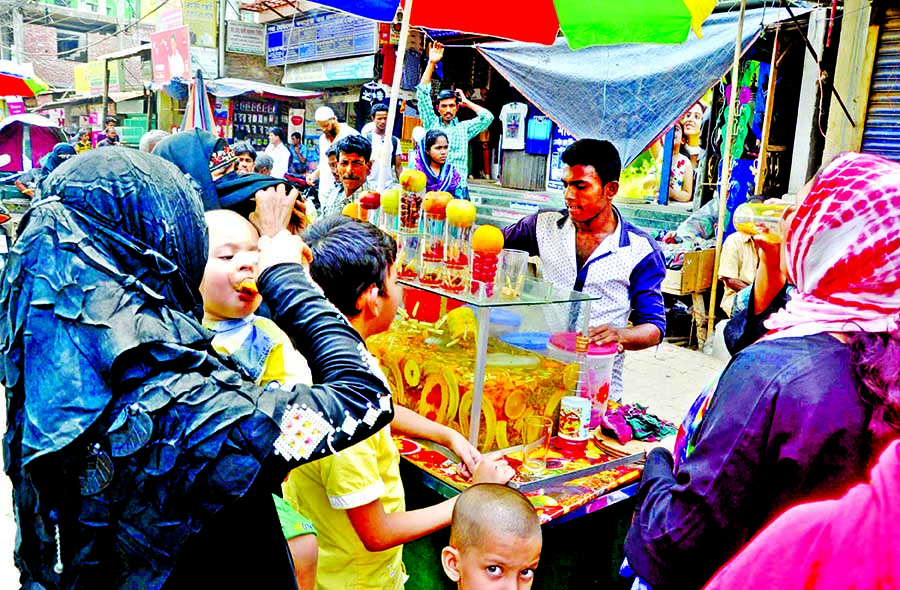
SM Mizanur Rahman :The scorching heat-wave now sweeping over the country in the last few days will continue until adequate rainfall as occasional rains have failed to pull the temperature down, say Meteorologists. “There seems to be no immediate end to this situation and the heat-wave may remain high for another week. Only adequate rains can bring relief from such extremely hot weather,” the duty-forecasting officer of the Met office told The New Nation on Saturday. A cool wind from the sea and pre-monsoon rains will only bring respite to the people, he said, adding humidity made the heat unbearable. According to Bangladesh Meteorological Department (BMD), the highest temperature was recorded at 39.2 degrees Celsius in Chuadanga yesterday. In the capital, the temperature was 36.2 degrees Celsius while in Rajshahi it was 38.5 degrees Celsius. Meanwhile, the unusually harsh summer heat in Telangana and Andhra Pradesh in neighbouring India has started taking a huge toll on its residents. At least 111 people have died due to sunstroke during the last few days as the two states are experiencing intense heat wave conditions. According to the Met department, there was appreciable rise in maximum temperatures at one or two places in Telangana.Temperatures have risen unusually in the first week of April with several parts of the country recording deviations of more than 5°C. Temperatures in parts of these states have crossed 43 degree. Significant relief from hot weather conditions is highly unlikely in the coming days, More than 100 people have died of sunstroke in Telangana and Andhra, a majority of them in the last week, as the state swelters under an intense heat wave.Besides, acute water crisis and frequent power failure have also worsened the situation across the country. Acute water crisis in many areas, especially of Dhaka and other cities of the country, has compounded sufferings of the dwellers.Sufferings of the city dwellers deepened in the capital for lack of adequate water supply by the Dhaka Water and Sewerage Authority and the sweltering summer heat.People are falling ill due to the heat-wave across the country. Diarrhoea, heatstroke and vomiting are now the most common ailments with the elderly people and children, say physicians. They added cases of skin rash, eruption, blister, heat rash, headache, eye-ache and skin burn have marked a rise. Diseases like high blood pressure, asthma and fever have also increased.The intensified heat-wave and high humidity levels hindered life at all levels, as people are falling ill or show reluctance to leave home in the sweltering heat.Mild to moderate heat wave is sweeping over Rajshahi, Rangpur and Khulna divisions and the regions of Tangail, Faridpur and Dhaka and it may continue and spread to adjacent area.Rain or thundershowers accompanied by temporary gusty or squally wind is likely to occur at one or two places over Sylhet division with hails at places and weather may remain mainly dry with temporary partly cloudy sky elsewhere over the country, said a Met Office release on Saturday. Day temperature may rise slightly and night temperature may remain nearly unchanged over the country.In the capital, fares for manually drawn rickshaws, vans and pushcarts are on the rise due to the unbearable working conditions. “I have been drinking saline water every half an hour to counter the severe sweating. The heat is like hell and it would not be possible pulling rickshaw if I do not drink a lot of water,” a rickshaw-puller said yesterday.Sales of seasonal fruits like watermelons, iced juices, and ice cream have also gone up due to high demand to cool the body, and the sales persons are also taking advantage of the situation hiking prices of these products.According to met office, 2015 was the warmest year in the history of earth while a huge number of people were killed in heat-wave in Pakistan and India. “There’s no doubt that temperature has increased in Bangladesh. We don’t find equilibrium in temperature, humidity and rainfall. We call it erratic behaviour of climate,” it said.Erratic temperature will cast adverse impacts on agriculture, ecosystem and biodiversity, and farmers will be adversely affected as they do not know when climatic extreme events will happen.

